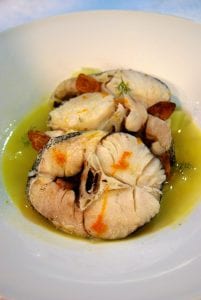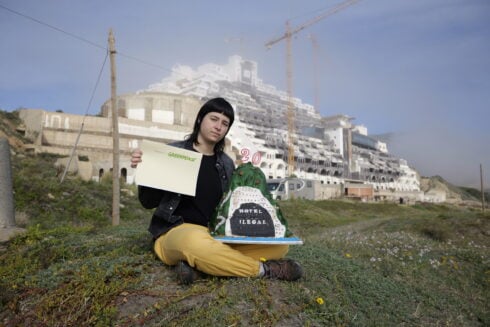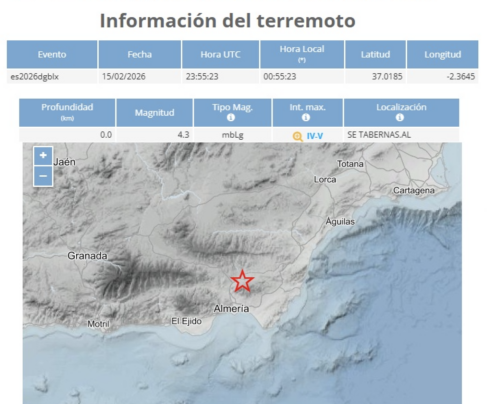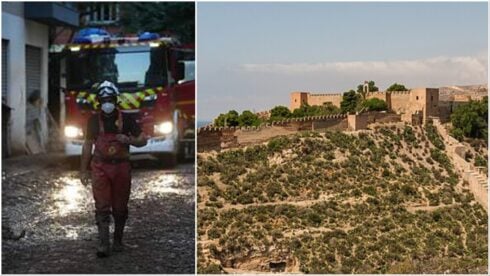LA ALCADIMA, LANJARON

Gonzalo Rodriguez, owner of La Alcadima, in Lanjarón, in the Alpujarras, turns out to be a dedicated, impassioned cook: “I studied traditional recipes and talked to old people who told me about their family dishes. Most of what we serve is Alpujarran as we have such a wealth of ingredients—and we’re lucky to have good soil and water. Further south they have to collect rainwater.” Witnessing him work in the kitchen is like watching a tornado, his turbulent energy in high contrast to his calm sous chef, Monserrat, who works steadily beside him. “It was the mix of Jews, Arabs, and Iberians that produced the incredible richness of our cuisine,” he insists.
Confit of sardines
Moraga de sardinas
This dish looks beautiful, even if it’s in a battered old pan. This traditional technique of preserving fish allowed it to be stored for months in a terracotta dish in a cool, dry pantry. However, unless you are very experienced in home canning with the proper equipment, it is best to serve immediately and store any leftovers in the fridge.

Serves 4 to 6
1 lb (500 g) sardines, tripes, scales,
and heads removed
2 cups (500 ml) extra virgin olive oil
2 cloves garlic, finely chopped
2 tablespoons pine nuts
12 black peppercorns
Salt
1 lemon, sliced
9 oz (250 g) clams, rinsed well
3 bay leaves
Lemon for juice
Small handful of parsley, chopped
Rinse the sardines well and drain. In a large wide pan or a terracotta dish, heat the oil over low heat, then add the garlic and the pine nuts and saute until just beginning to turn golden. Toss in the peppercorns, salt, lemon slices, and clams. Carefully lay the sardines in the oil like the spokes of a wheel, add the bay leaves, then squeeze some lemon juice over the top. Simmer until cooked, about 5 minutes, depending on the size of the sardines (Atlantic ones are bigger than Mediterranean ones), then remove from the heat and scatter with parsley. Serve at room temperature.

EL FARO DE CADIZ
Grandson of the founder of the legendary Faro restaurant, Mario Jimenez Cordoba is on a mission for change. “This place opened back in 1964,” his eyes widen, “so there’s a lot to renovate.” But nothing alters the steady rhythm of the piscatorial seasons or El Faro’s reputation as THE place for fish, rice, and seafood in Cadiz whether at the packed tapas bar or in the calmer restaurant. Right now red mullet is ending, and the famous almadraba season is beginning. “We just had 60 pounds (27 kg) of fresh Bluefin tuna delivered from Barbate!” He summons the kitchen ‘fisherman’ who emerges clutching a giant corvina, then shows me mountains of shrimp from Sanlucar. In this treasure trove of the ocean, every dish reflects tradition, freshness, and long experience.
El Faro’s fish soup with orange
Caldillo de perro
Typical of El Puerto de Santa Maria, the port across the bay from Cadiz, this tangy fish soup is said to date back to the Reconquista when its odd Spanish name was coined. Allegedly, Christians who were brought from the north to live in Cadiz called all pork-averse Muslims “dogs” (perros). For some reason, the fish soup gained the same nickname. What’s in a name though? The soup is delicate with a faint orange flavor, and since Mario insists that, “odd numbers are very important in a garnish,” make it three fennel fronds, not two.

Serves 4
2 tablespoons olive oil
6 cloves garlic, skinned and sliced
2 onions, chopped
4. quarts (4 litres) hot water
2 potatoes, sliced into half-moons
Salt
1 lb 5 oz (600g) fresh white fish steaks,
such as hake, with bones and skin
Generous . cup (200 ml) freshly
squeezed orange juice
Zest of 1 orange
Fennel fronds, to garnish
In a deep saucepan, heat the oil and fry the garlic until golden. Remove with a slotted spoon, leaving the oil in the pan, and set aside for the garnish.
Add the onion to the pan and saute. until translucent. Pour in 8. cups (2 litres) of the water, add the potato slices, and season with a pinch of salt. Simmer vigorously until the potatoes are nearly done, though still firm at the core, about 10 minutes. Lower the fish steaks into the liquid and pour in the rest of the water with the orange juice. Continue to simmer vigorously until the fish is cooked, about 7 minutes.
Remove the fish and set it aside. Using a slotted spoon, remove the potatoes and divide them among serving bowls. Arrange the fish pieces on top, cutting them if necessary, sprinkle with orange zest, and garnish with fried garlic and some fennel fronds. Pour the broth into a jug to serve at the table.
Click here to read more Spain News from The Olive Press.









In the third part of our exclusive serialisation, great Olive Press but where is the second part?? Read the first article by Fiona Dunlop but can’t find the second part that you are claiming. Any ideas!!